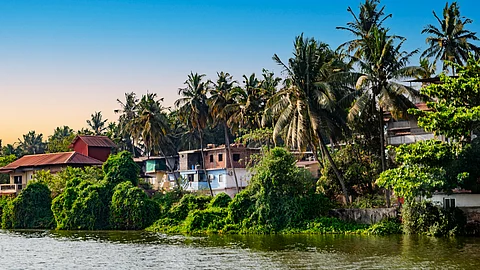

In a meeting presided over by Bhupender Yadav, the Union minister for Forests, Environment, and Climate Change, the National Wildlife Board (NWB) has declined to grant wildlife clearance for the Kalasa Nala Diversion Project, citing ongoing legal challenges by the Goa government in the Supreme Court pertaining to the Mahadayi project.
Additionally, in the 79th meeting of the Standing Committee of the NWB, it was also decided to grant approval to the Goa-Tamnar 400 kV power transmission line, which involves the utilisation of 435 acres of Karnataka’s ecologically sensitive forest land.
The decision is likely to stir controversy as environementalists and the state government of Kartnataka oppose the project. This is because extensive forest cover will be impacted in the implementation of the project.
The Kalasa Nala Diversion Project, which aims to divert water from the Mahadayi River to meet the drinking water needs of the drought-prone regions of Karnataka, has faced multiple legal and environmental hurdles.
On December 29, 2022, the Central Water Commission had approved a revised detailed project report, earmarking 1.78 thousand million cubic feet (TMC ft) for the Kalasa Nala Diversion.
To advance the project, the Karnataka government submitted a proposal requesting the NWB's approval to utilise forest land in seven villages of Khanapura taluk in Belgaum district for the construction of essential infrastructure, including a jackwell, pump house, electrical substation, and pipeline.
The proposal involved the use of 10.68 hectares of forest from the Kali and Sahyadri Tiger Reserves.
Although the Karnataka State Wildlife Board had approved the proposal and forwarded it to the Centre, the National Tiger Conservation Authority (NTCA) expressed concerns.
The NTCA had dispatched a team of experts to conduct a fact-finding study in the Mahadayi project area, leading to several recommendations that are still pending a formal response.
The NWB’s refusal to grant clearance is largely due to the Goa government's ongoing legal tussle in the Supreme Court challenging the Mahadayi project, and the lack of a definitive stance from the NTCA.
The Mahadayi project entails building barrages on the Kalasa and Banduri streams of the Mahadayi river which flows through Karnataka, Goa and Maharashtra. The project was conceived in the 1980s but it has faced bureaucratic hurdles owing to a riverine dispute between the three states.
Meanwhile, according to Karnataka’s additional chief secretary in the Forest Department, the matter has been deferred to the NWB’s next meeting, further delaying the project that has long been a bone of contention between Karnataka and Goa.
The NWB’s granting of conditional wildlife approval for the Goa-Tamnar 400 kV power transmission line has irked environmentalists. The power line is set to traverse through ecologically sensitive regions of Karnataka.
The proposed power line, which seeks to connect Narendra in Dharwad to Goa, will cut through critical wildlife habitats, including the Dandeli Elephant Corridor, Bhimgad Sanctuary Eco-Micro Zone, Kali Tiger Reserve Eco-Micro Zone, and Dandeli Sanctuaries.
This route involves the destruction of a substantial portion of forest land, raising concerns about its environmental impact.
The Goa government had sought approval for the use of 27 hectares of forest within the Bhagwan Mahaveer Wildlife Sanctuary for this project, and it has now been granted.
However, the NWB has imposed a condition that no work should commence on the Karnataka side until the project proposal receives a recommendation from Karnataka's wildlife board.
The project has been contentious since its inception.
In 2019, Goa Tamnar Transmission Project Limited submitted a proposal to the Karnataka government seeking permission to use forest land for the power line.
A site inspection by the Chief Conservator of Forests in Canara circle highlighted the project’s potentially devastating impact on the Western Ghats’ dense forest and tiger habitats, recommending its rejection. In 2021, the Principal Chief Conservator of Forest also advised against the project.
The Goa Foundation, an environmental non-governmental organisation (NGO), had previously petitioned the Supreme Court to halt the project.
The Court directed the Central Empowered Committee (CEC) to review the proposal. The CEC recommended that the existing 220 kV line be used to minimise environmental damage, and urged the Karnataka government to be consulted before proceeding.
Despite these recommendations, the NWB has moved forward with conditional approval, prompting criticism from environmentalists and state officials.
The conditional approval for the Goa-Tamnar project has drawn sharp criticism, particularly from Karnataka-based environmentalists and political leaders.
Wildlife conservationist Giridhar Kulkarni condemned the NWB's decision as a ‘pressure tactic’ and a violation of the Supreme Court's judgement in the Lafarge case, which emphasises the protection of ecologically sensitive zones.
“NWB's decision to allow the project to proceed, even conditionally, undermines Karnataka's ecological interests and sets a dangerous precedent. Karnataka's political leaders set aside partisan differences and unite against the plan in the upcoming state wildlife board meeting,” Kulkarni argued.
Previously, Karnataka Forest Minister Eshwara Khandre had instructed state officials to reject the Goa-Tamnar proposal, underscoring the state's firm opposition to the project.
The recent developments are likely to reignite tensions between Karnataka and Goa, with the potential for further legal battles as both states vie to protect their respective interests.
As the controversy deepens, the NWB's decisions on the Kalasa Nala Diversion and Goa-Tamnar projects underscore the complex interplay between environmental conservation and developmental needs, with far-reaching implications for Karnataka's forests and wildlife.